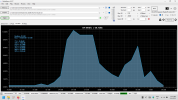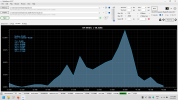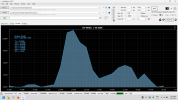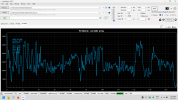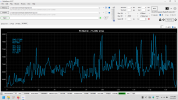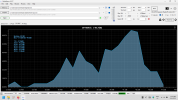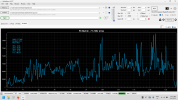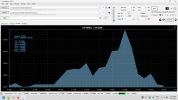Those familiar with DeltaWave and the Gearspace thread on null testing have likely seen mine (and others) comments that the null RMS metric can be skewed by filter phase differences caused by the DAC and/or the ADC in the loopback. What follows is an investigation into the effect that such a DC filter might have on the null measurement.
Since a hardware DC filter usually is just an HP filter with a corner frequency at or below 1Hz,

a simple software emulation of this circuit can be a minimum-phase high-pass filter.
Based on a recent conversation with @manisandher, I added the ability to apply such a filter in DeltaWave. The next step was to analyze the effect that this can have on various devices.
Here are a few recent loopback results posted on the Gearspace thread, processed with and without the DC filter correction using DeltaWave:
Notice that the null RMS has improved, and in some cases, significantly (from -58dB to -85dB, for example).
There are also a number of cases where there was no, or very little improvement observed. This may indicate that there was no DC-blocking filter in the circuit, it was not minimum phase, or that possibly the loopback RMS value was dominated by something else.
Filter corner frequency in each case was picked by trial-and-error, so as to linearize the phase response as much as possible. Here's an example of what Fostex VC8 loopback phase looks like without filter correction:

And after minimum-phase HP filter correction:

Based on these results, it would appear that a DC filter (very commonly found in ADC devices) can have a significant impact on the null RMS metric.
I also tested these loopbacks by applying a linear-phase equivalent of the minim-phase filter. In all cases, a linear-phase HP filter had no, or very little effect on the null RMS value. From this I conclude that it's not the amplitude response of the DC-blocking filter that is causing the observed improvement, but primarily, the phase.
Since a hardware DC filter usually is just an HP filter with a corner frequency at or below 1Hz,
a simple software emulation of this circuit can be a minimum-phase high-pass filter.
Based on a recent conversation with @manisandher, I added the ability to apply such a filter in DeltaWave. The next step was to analyze the effect that this can have on various devices.
Here are a few recent loopback results posted on the Gearspace thread, processed with and without the DC filter correction using DeltaWave:
| Device | RMS Null | RMS Null (DC filter removed) | HP frequency | Improvement |
|---|---|---|---|---|
| Audio Alchemy DDE v1.0 => Presonus Studio 192 | -39.9dB | -49.9dB | 1.10Hz | -10.0dB |
| Fostex VC8 (0dB) | -46.1dB | -64.2dB | 0.75Hz | -18.1dB |
| Metric Halo LIO 3D | -58.1dB | -84.9dB | 0.35Hz | -26.8dB |
| Metric Halo 2882 3D | -35.2dB | -57.0dB | 1.60Hz | -21.9dB |
| Presonus Studio 192 int sync | -49.6dB | -72.6dB | 0.58Hz | -23.0dB |
Notice that the null RMS has improved, and in some cases, significantly (from -58dB to -85dB, for example).
There are also a number of cases where there was no, or very little improvement observed. This may indicate that there was no DC-blocking filter in the circuit, it was not minimum phase, or that possibly the loopback RMS value was dominated by something else.
Filter corner frequency in each case was picked by trial-and-error, so as to linearize the phase response as much as possible. Here's an example of what Fostex VC8 loopback phase looks like without filter correction:
And after minimum-phase HP filter correction:
Based on these results, it would appear that a DC filter (very commonly found in ADC devices) can have a significant impact on the null RMS metric.
I also tested these loopbacks by applying a linear-phase equivalent of the minim-phase filter. In all cases, a linear-phase HP filter had no, or very little effect on the null RMS value. From this I conclude that it's not the amplitude response of the DC-blocking filter that is causing the observed improvement, but primarily, the phase.
